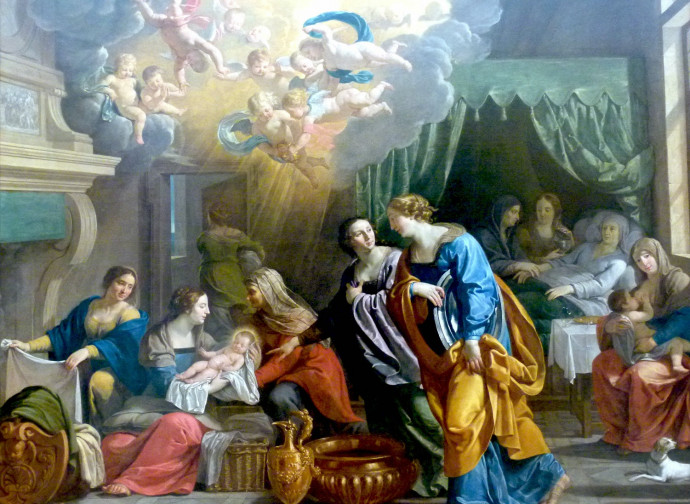Nativity of the Blessed Virgin Mary
Today's feast celebrates the mystery of the birth of Mary Most Holy, Mother of the Saviour.

“Let us celebrate with joy the Nativity of the Blessed Virgin Mary, for from her arose the sun of justice, Christ our God.” The liturgical antiphon expresses incisively the reason for today's feast, which celebrates the mystery of the birth of Mary Most Holy, Mother of the Saviour. The feast has its origin in the East, falls exactly nine months after the feast of the Immaculate Conception and is common to Catholics and Orthodox Christians. The date of 8 September has a connection with the dedication in the 4th century of the present church of St Anne in Jerusalem (initially dedicated to her glorious daughter), which was built near the house where the Virgin Mary lived with her parents Anne and Joachim. The celebration was extended to the West during the pontificate of St Sergius I (687-701), born in Palermo to Syrian parents.
The birth of Mary had been prepared from the beginning. The mission of the “new Eve” is in fact foretold by God immediately after the original sin was committed, in the words addressed to the satanic serpent: “I will put enmity between you and the woman, between your lineage and her lineage: she shall crush your head, and you shall lie in wait for her heel” (Gen 3:15). That is why the ancient Fathers called this passage the “proto-gospel of salvation”, seeing both the proclamation of Mary and the blessed fruit of her womb, Jesus, the new Adam, incarnated for the Redemption of mankind. From here the Nativity of the Blessed Virgin acquires its greatest meaning: “The true meaning and purpose of this event is the Incarnation of the Word. In fact, Mary was born, nursed, and raised to be the Mother of the King of centuries, of God”, commented St Andrew of Crete.
This explains the jubilation in Heaven and the abundance of graces poured out on earth at Mary's birth, an event revealed in glorious details to the great mystics, such as Blessed Anne Catherine Emmerich: “Then I saw the room filled with supernatural light which became more intense as it wove itself round Anna. The women sank to the ground as though stunned. The light round Anna took the exact form of the burning bush of Moses on Horeb, and I could no longer see her. The whole flame streamed inwards; and then I suddenly saw that Anna received the shining child Mary in her hands, wrapped her in her mantle, pressed her to her heart, and laid her naked on the stool in front of the holy relics, still continuing her prayer. Then I heard the child cry, and saw that Anna brought out wrappings from under the great veil which enveloped her. She wrapped the child first in grey and then in red swaddling bands up to her arms. […] They all joined in a hymn of praise, and Anna lifted her child up on high as though making an offering. I saw at that moment the room full of light, and beheld several angels singing Gloria and Alleluia”, we read in her Life of Mary.
The birth of that child, daughter of Israel, is the link between the Old and the New Covenant, a sign that the promise of salvation and God's love embraces all peoples. It is no coincidence that St Matthew begins the first Gospel with the genealogy of Jesus, culminating in this verse: “Jacob begat Joseph, the bridegroom of Mary, from whom Jesus called Christ was born” (Mt 1:16). The Holy Family, with God at its centre, descended among men to raise them up to Him. In this light, St Peter Damian would speak of the Nativity of Mary in this way: “Today is the day when God begins to put his eternal plan into practice, since it was necessary to build the house before the King came down to live in it. A beautiful house, for if Wisdom built a house with seven worked columns, this palace of Mary rests on the seven gifts of the Holy Spirit. Solomon solemnly celebrated the inauguration of a stone temple. How will we celebrate the birth of Mary, temple of the Incarnate Word?”.
